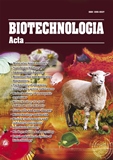ISSN 2410-7751 (Print)
ISSN 2410-776X (Online)

Biotechnologia Acta Т. 17, No. 2 , 2024
P. 87-89, Bibliography 4, Engl.
UDC:: 577.161.2+611.018.8
DOI: https://doi.org/10.15407/biotech17.02.087
VITAMIN D3 AFFECTS GLUCOCORTICOID-SENSITIVE RECEPTORS AND BRAIN-DERIVED NEUROTROPHIC FACTOR IN PREDNISOLONE-INDUCED NEUROTOXICITY
D.I. Yevstifeiev 1, O.O. Lisakovska 2, A.V. Khomenko 2, I.O. Shymanskyi 2
1 Bogomolets National Medical University, Kyiv, Ukraine
2 Palladin Institute of Biochemistry of the National Academy of Sciences of Ukraine, Kyiv
Aim. The study aimed to explore the effects of vitamin D3 (D3) on markers of brain tissue metabolism in prednisolone-induced neurotoxicity in rats.
Methods. Female Wistar rats received prednisolone (5 mg/kg of b.w.) with or without D3 (1000 IU/kg of b.w.) for 30 days. Serum 25-hydroxyvitamin D3 (25D3) and brain tissue BDNF levels were measured by ELISA. We used western blotting to determine levels of glucocorticoid-sensitive receptors: GRα/β (glucocorticoid receptor) and MR (mineralocorticoid receptor). The number of astrocytes in histological sections of the cerebral cortex and hippocampus CA1-CA3 regions was assessed by immunofluorescent labeling of the macroglial marker protein GFAP (glial fibrillary acidic protein). Data were statistically analyzed using one-way ANOVA followed by Tukey’s test. The significant level was set at P < 0.05.
Results. Long-term administration of prednisolone decreased serum and brain tissue 25D3 levels and increased the GR/MR ratio, suggesting a potential neurotoxic effect. It also increased brain tissue BDNF levels and astrocyte numbers in histological sections of rats` brains. D3 supplementation entirely or partially reversed the alterations, elucidating its neuroprotective effect.
Conclusions. The study suggests that D3 deficiency may contribute to neuropathological changes induced by long-term exposure to prednisolone. Based on the identified positive effects of D3 on the CNS, its practical usefulness in the complex treatment of neurological and cognitive disorders associated with GC-based therapeutics can be envisaged.
Key words: Glucocorticoid-induced neurotoxicity, prednisolone, vitamin D3, brain-derived neurotrophic factor, steroid receptors, astrocytes.
© Palladin Institute of Biochemistry of National Academy of Sciences of Ukraine, 2024

